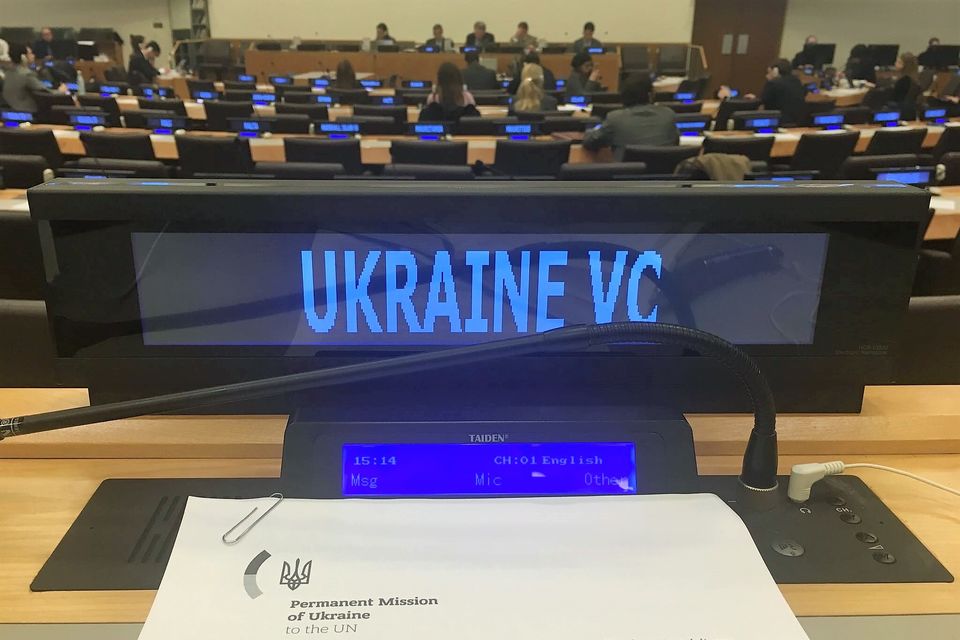Виступ делегації України на засіданні Спеціального комітету щодо Статуту ООН

Mr. Chair,
Ukraine aligns itself with the statement delivered by the European Union. I will also make a few remarks in the national capacity.
Let me begin with expressing our gratitude to the Secretariat for preparation of the meeting and join others in welcoming members of the Bureau.
We hope that issues before the Committee will be considered rationally and pragmatically with a necessary level of flexibility to achieve a common denominator in the interest of our organization and all its members.
Mr. Chair,
Since the very establishment of the Committee, Ukraine actively supported its efforts to increase efficiency of the UN and strengthen it accordingly.
The Charter has withstood dramatic changes in international relations and proved its key place in today’s global architecture as the primary international legal instrument for preserving international peace.
In the context of the item «Maintenance of international peace and security», we share the views that sanctions are the most powerful non-military response to the threats to global peace and security. They continue to be an important tool for countering terrorism, preventing conflicts, consolidating peace agreements, protecting civilians and curbing the proliferation of weapons of mass destruction.
In our view, the current practice of introducing more precise and targeted sanctions is aimed at prevention of possible unintended or adverse socioeconomic and humanitarian consequences in specific States or third States. As an elected members of the Council in 2016-2017, Ukraine also noted progress achieved in designing and monitoring of implementation of UN sanctions regimes.
Mr. Chair,
It is a sad irony that exactly 4 years ago one of the most blatant violations of the UN Charter in recent history has been committed. The armed aggression against Ukraine was launched by one of the permanent members of the Security Council. Instead of fulfilling its obligation to maintain peace and security, it continues to temporarily occupy the Autonomous Republic of Crimea and the city of Sevastopol, as well as certain areas of the Donetsk and Luhansk regions.
In this regard, I would like to turn briefly to the item «Peaceful settlement of disputes». We proceed from the fact that Article 33 of the Charter envisages an obligation to settle any international disputes peacefully and provides a toolkit to do so. In this regard we are resorting to all means available to UN Members States to resolve the situation that arose as the result of the Russian military aggression against Ukraine.
Thus, we initiated proceedings in the ICJ against the Russian Federation concerning the Application of the International Convention for the Suppression of the Financing of Terrorism and of the International Convention on the Elimination of All Forms of Racial Discrimination.
Together with a number of other states we work on establishing an accountability mechanism for the downing of Malaysia Airlines flight MH17.
We lodged two declarations pursuant to article 12(3) of the Rome Statute to enable the ICC to exercise its jurisdiction over crimes committed against the civilian population during the Revolution of Dignity and war crimes perpetrated since the beginning of the military aggression against Ukraine.
Just yesterday, Ukraine filed its Memorial in arbitration proceedings against the Russian Federation under the 1982 United Nations Convention on the Law of the Sea (“UNCLOS”). The Memorial establishes that Russia has violated Ukraine’s sovereign rights in the Black Sea, Sea of Azov, and Kerch Strait.
I would like to stress that we consider negotiations as one of the fundamental methods of settlement of disputes. Before lodging the above cases in various international judicial organs, we exhausted all venues of negotiations at all levels, which left us with no other option but to pursue litigation to achieve a peaceful settlement.
Taking this into account our delegation is of the opinion that instead of spending efforts and resources on realizing initiatives of technical nature under the mentioned item, practical implementation of existing legal tools for peaceful settlement of disputes between states should be an absolute priority for member states.
Mr. Chair,
We also consider that the work of the Committee needs to be prioritized to resolve concrete situations before the Organization and to avoid duplications of its efforts.
The Committee needs to make a shift from seeking political compromises on issues, which are not likely to move any further after remaining dormant for a few years. In order to strengthen the UN capability for timely and adequate reaction on existing and future challenges, this shift has to take us to finding legal decisions and solutions vis-à-vis current problems and situations.
Thank you.
